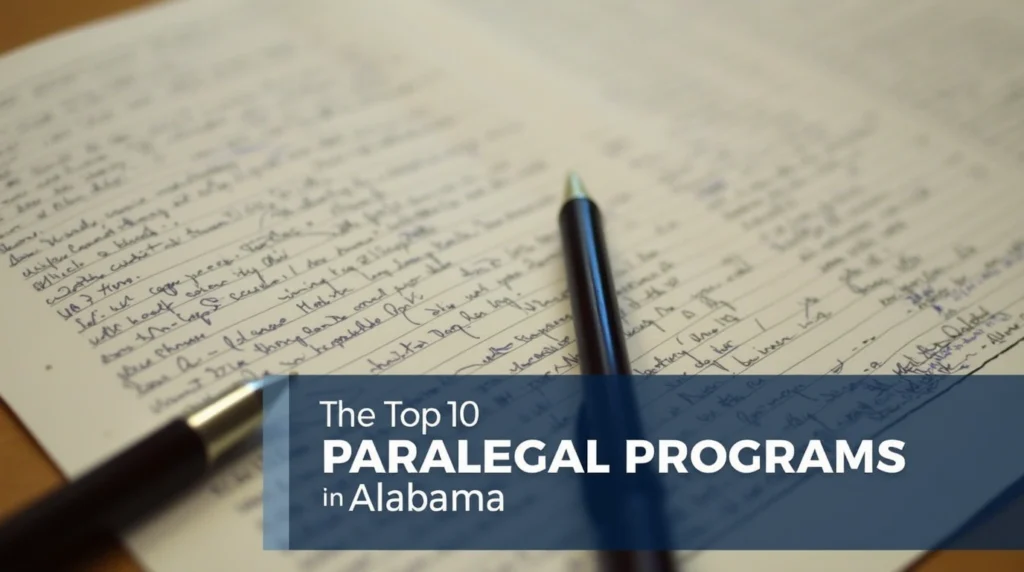Hey there. If you’re reading this, you’re probably wondering how to break into the paralegal world in Alabama—or maybe level up if you’re already in it. I’ve been around this field for years, watching grads hustle into law firms, government gigs, and corporate offices across the state. Alabama’s legal scene? It’s got its own flavor—smaller firms in tight-knit towns, big players in Birmingham and Montgomery, and a growing need for sharp paralegals everywhere. The Bureau of Labor Statistics backs this up: they’re projecting 37,300 paralegal jobs nationwide in the next decade, and Alabama’s slice of that pie is real. Salaries here? Anywhere from $39,710 for newbies to $98,830 if you’ve got experience and the right credentials.
But here’s the thing—not every program’s going to get you there the same way. Alabama’s got a mix of options: quick certificates, two-year associate degrees, even full bachelor’s programs. Some are ABA-approved, some aren’t, and honestly, it’s not always a dealbreaker. I’ve seen folks from all kinds of schools make it work. So, let’s dig into the top 10 paralegal programs in Alabama—real talk, no fluff. This isn’t just a list; it’s a guide to help you figure out what fits you. Grab a coffee, and let’s walk through it.
Table of Contents
Why Choose a Paralegal Career in Alabama?

Choosing a paralegal career in Alabama has many benefits. The legal field here offers a variety of work settings. You can work in private law firms, government agencies, or corporate legal departments. This variety ensures a dynamic and engaging work environment. As a paralegal, you’ll play a key role in the legal process. You’ll assist attorneys in delivering justice and helping people.
Alabama’s paralegal programs are flexible, making it easier to get the education you need. You can take online courses or evening classes. This flexibility is great for working adults who want to advance their careers. Getting a paralegal certification,
This can help you stand out in a competitive job market. Paralegals in Alabama also earn a good salary. The average salary ranges from $50,000 to $60,000 per year. This salary, combined with the variety of career opportunities, makes a paralegal career in Alabama very appealing. In summary, a paralegal career in Alabama is a great choice. It offers diverse work settings, competitive salaries, and flexible education options.
The Top 10 Paralegal Programs in Alabama: What You Need to Know
1. Samford University – Legal Studies Programs (Birmingham)
Samford’s a heavyweight. Tucked into its Cumberland School of Law, the paralegal certificate program’s got a reputation that echoes through Birmingham’s legal circles. It’s ABA-approved, which means it’s built to high standards—think mock trials, legal research, and connections to top firms. I’ve known grads who walked out of here straight into litigation support roles. It’s not cheap, and the bachelor’s options (like History with Legal Studies) lean academic, but if you want a name that opens doors, this is it. Perfect for someone eyeing law school later or a big-city gig.
2. University of Alabama – Continuing Studies Certificate (Tuscaloosa)
UA’s program is a sleeper hit. It’s a certificate through their continuing studies arm—ABA-approved, practical, and taught by actual attorneys. We’re talking real cases in the classroom, not just textbook stuff. Placement rate’s around 85% within three months, which is hard to argue with. It’s not a degree, so it’s quicker—great if you’ve already got some college under your belt and want to pivot fast. Firms in Tuscaloosa and beyond know the UA stamp.
3. Auburn University at Montgomery (AUM) – Justice and Public Safety with Legal Studies
AUM’s got a bachelor’s in Justice and Public Safety with a paralegal twist—ABA-approved and meaty. It’s not just about paralegal skills; you’re learning the whole justice system. Legal research, e-discovery, even a shot at internships in Montgomery’s buzzing legal hub. I’ve seen grads from here thrive in court systems and law offices alike. Evening and weekend options make it doable if you’re working. It’s a longer haul, but the payoff’s there if you want a deeper foundation.
4. Faulkner University – BS in Legal Studies (Montgomery)
Faulkner’s faith-based, but don’t let that scare you off—it’s open to anyone, and the Legal Studies bachelor’s is legit. Litigation support, ethics, legal writing—it’s all here, with a four-year track that’s ABA-approved. A paralegal I worked with swore by their family law training; landed her a gig with an insurance defense firm. If you’re in Montgomery and want a full degree with a moral backbone, Faulkner’s a contender. Online options sweeten the deal.
5. Gadsden State Community College – AS in Paralegal (Gadsden)
Gadsden’s been at this for over 40 years—ABA-approved and proud of it. This two-year associate’s degree is all about the grind: legal forms, research, litigation support. The externships with county prosecutors? Gold. A buddy of mine who teaches there says grads often turn those into jobs. Affordable, practical, and respected in northeast Alabama. If you’re near Gadsden and want a straight shot into the field, this is your move.
6. Calhoun Community College – AAS in Paralegal Studies (Decatur)
Calhoun’s a workhorse in the Tennessee Valley. Their ABA-approved associate’s degree—two years, $3,930 in-state tuition—gets you ready for Huntsville’s tech-driven legal market. IP law, legal writing, internships—it’s built for the real world. I’ve met paralegals from here who could dissect a case faster than some lawyers. Great value, especially if you’re feeding into Huntsville’s growth.
7. Coastal Alabama Community College – AAS in Paralegal (Bay Minette & Beyond)
Coastal’s got reach—campuses from Fairhope to Brewton—and their associate’s degree is a solid bet. Not ABA-approved, but don’t sleep on it. Torts, contracts, research—it’s practical and cheap. Smaller classes mean you’re not just a number. Grads I’ve run into work everything from real estate to small law firms. If you’re south of I-20, this one’s accessible and gets the job done.
8. Wallace State Community College – AAS in Paralegal Studies (Hanceville)
Wallace State’s two-year AAS keeps it simple: legal research, criminal law, estate planning. No ABA approval, but at $3,930 in-state, it’s a steal. I’ve seen their grads shine in Dothan and rural offices—places where practical skills trump prestige. Day and evening classes make it workable if you’ve got a job. It’s not flashy, but it’s effective.
9. Alabama State University – Certified Paralegal Course (Online)
ASU’s online certificate is a game-changer—$2,495, self-paced, and preps you for the NALA CP exam. No ABA approval, but it’s flexible as hell. I’ve watched folks with full-time jobs knock this out in six months and land state agency roles in Montgomery. You get a capstone project, real-world prep, even a free laptop. If you’re strapped for time or cash, this one’s hard to beat.
10. University of South Alabama – Paralegal Studies Certificate (Mobile)
South Alabama’s certificate takes a year—three trimesters, night classes—and it’s built for working adults. Not ABA-approved, but it’s hands-on: civil litigation, estate planning, legal software. A paralegal I know from Mobile swears it gave her the edge in coastal real estate law. If you’re down south and need something that fits your life, this is a strong pick.

What Makes A Paralegal Programs in Alabama Stand Out?
Here’s where it gets fun. These 10 paralegal programs in Alabama aren’t just names on a page—they’ve got quirks and strengths that set them apart. Samford and UA bring prestige and connections. Gadsden and Calhoun? They’re battle-tested, pumping out grads who hit the ground running. ASU’s online hustle is a lifeline for busy folks, while AUM and Faulkner offer that bachelor’s depth if you’re thinking long-term. Coastal and Wallace keep it local and affordable—perfect for rural or small-town gigs. South Alabama’s got that Mobile niche locked down.
The data backs this up too. BLS says Alabama had 4,130 paralegals in 2020, and demand’s only climbing. Programs like these are feeding that growth, whether it’s quick certificates (Auburn’s 12-weekend sprint) or two-year degrees (Wallace’s $3,930 price tag). And the ABA approval? It’s a bonus—Gadsden, Calhoun, and AUM have it—but Alabama’s chill rules mean you can still thrive without it.
Picking the Right Program: Real-World Advice

Alright, let’s get practical. Choosing from these 10 paralegal programs in Alabama isn’t about “the best”—it’s about your best. I’ve seen too many folks jump into the wrong fit and regret it. So, here’s how to think it through:
- Time and Money: Got a tight budget? Coastal or Wallace won’t break you. Need it fast? ASU’s online or Auburn’s certificate can have you working in months. Willing to invest? Samford or Faulkner’s degrees pay off long-term.
- Location: Birmingham? Samford or UA. Montgomery? AUM, Faulkner, or ASU. Northeast? Gadsden. South? Coastal or South Alabama. Match the program to where you’ll job hunt.
- Goals: Law school dreams? AUM or Samford. Quick entry? Calhoun or Gadsden. Government work? ASU’s regulatory focus or South Alabama’s capstone.
- Flexibility: Working 9-to-5? ASU’s online or South Alabama’s nights. Full-time student? Faulkner or Calhoun.
Pro tip: Call these schools. Ask about job placement, instructor backgrounds, internships. A paralegal I mentored once told me she picked Gadsden because the director hooked her up with a prosecutor’s office gig—changed her life. That’s the kind of edge you want.
Challenges and Curveballs
Not everything’s rosy. Some programs—like Shelton State’s certificate—pop up in lists but are tough to verify. I couldn’t nail down details; might be dormant by March 15, 2025. Virginia College? It’s got baggage from its parent company’s collapse, though the paralegal track held ABA approval last I checked. And Samford’s bachelor’s isn’t a straight paralegal program—more of a legal studies vibe—so clarify your focus there. Check current status before you commit; schools shift gears fast.
Another twist: ABA approval’s nice, but Alabama doesn’t require it. Firms might care, or they might not—I’ve seen both. Weigh that against cost and time.
The Bottom Line
Here’s the truth I’ve learned over years in this game: paralegal programs in Alabama are as good as what you put into them. The top 10 I’ve laid out—Samford to South Alabama—cover the spectrum. Prestige, practicality, flexibility, affordability—you name it, it’s here. But it’s on you to match the program to your life. Want to hustle into a firm fast? Grab a certificate. Eyeing a bigger career arc? Go for the degree. Wherever you land, Alabama’s legal world’s got room for you. Just pick smart, work hard, and don’t skip the networking—coffee with a working paralegal beats a brochure any day.
FAQ
What are the best paralegal programs in Alabama for quick entry?
Auburn University’s 12-weekend certificate and Alabama State’s online course get you into the field fast—think months, not years.
Can I study paralegal programs in Alabama online?
Absolutely. Alabama State University’s $2,495 course is fully online, and Faulkner offers online coursework too.
How much can I earn after completing paralegal programs in Alabama?
Starting around $39,710, up to $98,830 with experience, per BLS data—depends on your program and hustle.


hello do you have any thing for international student